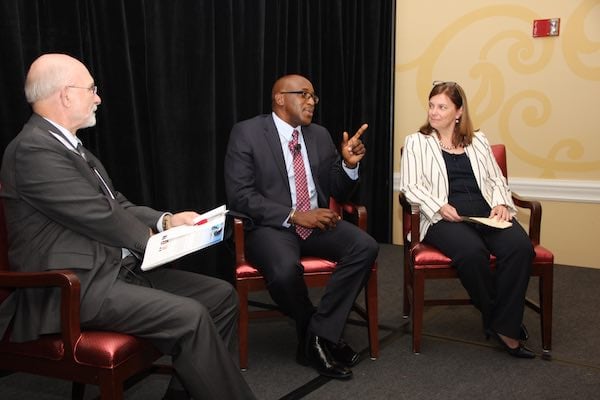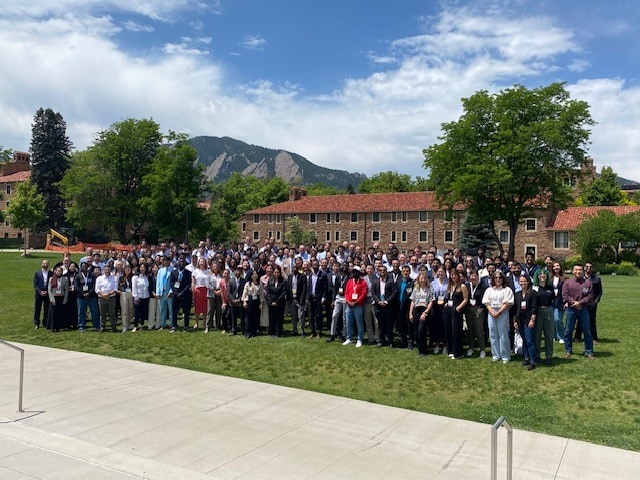
[Image above] (From left) David Johnson Jr., Everton Callum, and Dana Goski talk demographics during a panel discussion at CLS 2016. Credit: ACerS
Well, folks, it’s been an exciting time for the ceramic and glass community this week in Cleveland. Driven by Ceramics Expo 2016 (read the wrap-up), our industry seized the opportunity to build this into a “power week.”
We’ve been hearing reports of companies conducting company-wide strategy meetings, vendor–supplier meetings, and more business breakfasts than I can count. In addition, ACerS organized an OSHA industrial safety course, the 5th Ceramic Leadership Summit, a breakfast for ACerS Corporate Members, and strategy meetings of the ACerS Manufacturing Division.
Ceramic and Glass Power Week!
A few reflections and highlights:
The OSHA industrial safety short course on Sunday and Monday provided critical training for 20 students. Most short course attendees were employed by companies also exhibiting at Ceramics Expo.
While the production “front line” sharpened their safety skills, “top line” senior managers had the opportunity to attend ACerS 5th Ceramic Leadership Summit on Monday and Tuesday. This unique meeting brought together about 80 executives, senior managers, and rising young professionals interested in management to discuss innovation, economic factors driving manufacturing, and successful entrepreneurship.
Unique to CLS, organizers bring in experts from outside the ceramic and glass industry to shake up the audience’s baseline assumptions and challenge new ways of thinking. This year, John Nottingham of the Cleveland-based design firm Nottingham-Spirk got people thinking with his concept of “creative collisions,” wherein a mash-up of two really different products can come together to make a new product—often with stunning financial success.
Nottingham cited several examples. One of the company’s first successes was to combine the traditional child’s red wagon with the rotational molding technology used to make hospital bed pans. The “creative collision” led to the Little Tikes brand of toys for preschoolers and revenues that went from $600K to $600 million. Not bad!
The importance and value of early failure emerged as an unplanned theme. Matthew O’Connell from GE manages scale-up manufacturing for the ceramic-matrix composites that are going into LEAP and future engines. O’Connell emphasized the importance of failing as early as possible, and he thinks of it as an essential part of the learning process. It’s the only way to avoid turning on the “scrap maker machine—a silent machine that gets turned on early, but we don’t know about it until farther downstream,” he says. Regarding the importance of early failure, “Think about the journey instead of the outcome,” he says.
Later, serial entrepreneurs Keith Blakely, Vladimir Ban, and Bill Payne picked up on the role of failure and its value to the innovation process. All three validated O’Connell’s premise that early failure helps point the way to success.
Just in case you missed our earlier posts, check out our report from Tuesday morning and afternoon, Wednesday morning and afternoon, and Thursday morning and afternoon.
Thanks for coming along with us—and see you next year for Ceramic Expo and Ceramic and Glass Power Week 2017!

Matthew O’Connell, industrialization leader of ceramic matrix composites at GE Aviation, talks about production scale-up at CLS 2016. Credit: ACerS

(From left) Keith Blakely, Vladimir Ban, Bill Payne, David Gunderson, and moderator David Johnson Jr. discuss business development at CLS 2016. Credit: ACerS

Marvin Bolt, curator of science and technology at the Corning Museum of Glass, delivers an exciting talk during the CLS dinner. Credit: ACerS

Bolt captivated the CLS dinner crowd with his talk on an early telescopic view of innovation. Credit: ACerS

Visitors eagerly awaited the opening of the doors to Ceramics Expo each morning. Credit: ACerS

The view was great at Ceramics Expo 2016. Credit: ACerS

Attendees network in front of the CoorsTek booth. Credit: ACerS

ACerS executive director Charlie Spahr (left), Smarter Shows CEX event director Adam Moore (center), and ACerS director of membership, meetings, and technical publications Mark Mecklenborg (right) celebrate a successful show in the ACerS booth. Credit: ACerS
Author
Eileen De Guire
Spotlight Categories
- Meeting Highlights


